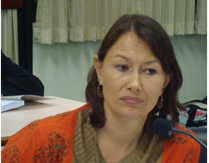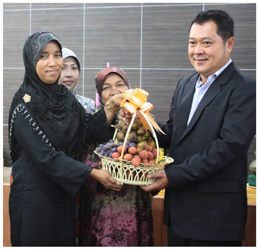Mixed reactions to government’s payouts
 The right of access to compensation or rehabilitation cannot be traded or exchanged with the right of access to the truth and justice, according to Ms Caitlin Reiger, an Australian advisor to the International Centre for Transitional Justice.
The right of access to compensation or rehabilitation cannot be traded or exchanged with the right of access to the truth and justice, according to Ms Caitlin Reiger, an Australian advisor to the International Centre for Transitional Justice.
Ms Reiger who has more than ten years of working experience on compensation issue in areas of conflict including Cambodia and former Yugoslavia recently told Isra news agency that from her thorough study of the unrest problem in the deep South she found that there were still several problem which were hidden or swept under the rug.
Right of access to compensation and the right of access to the truth and justice are two separate issues and they cannot be traded or exchanged, she said, adding that the right of access to the truth and justice means that the wrongdoers must be brought to face the justice.
Likewise, the compensation package endorsed by a panel headed by Justice Minister Pracha Promnok for families of the victims of Tak Bai, Krue Se and Sabayoi incidents without addressing the problem of the truths about the violent incidents and retribution for the wrongdoers is not the right solution.
Undoubtedly, most families of the victims of southern violence welcomed the compensation package with a minority of them demanding not just the financial help but the truths about the tragic incidents and justice for those responsible for the violence.
Koleeyoh Hali who lost her 63-year old father in the Krue Se mosque attack by government forces on April 28, 2004 told Isra news team that she was unhappy with General Pracha panel’s decision on compensation package.
As agreed by the panel, families of the Tak Bai and Sabayoi dead victims will each receive 7.5 million baht in compensation whereas families of the Krue Se victims will each get only four million baht in compensation.
 Ms Koleeyoh said she didn’t understand what was the basis used by the panel to determine that the families of Tak Bai and Sabayoi victims should be entitled to 7.5 million baht each and the Krue Se incident only four million baht each.
Ms Koleeyoh said she didn’t understand what was the basis used by the panel to determine that the families of Tak Bai and Sabayoi victims should be entitled to 7.5 million baht each and the Krue Se incident only four million baht each.
She insisted that not all the dead victims killed at Krue Se mosque were insurgents or suspected insurgents as assumed by government officials. Citing the case of her father, she said he was just an old man who went to the mosque to pray and who had nothing to do with the insurgency movement.
Koleeyoh admitted that the four million baht in compensation for Krue Se victims was a huge amount for people who have to struggle to make ends meet. But she said she was not happy with the financial arrangement because she learned that most members of the panel felt that the Krue Se victims should not be compensated at all. But General Pracha suggested that, for the sake of humanity, the victims should receive compensation up to four million baht each.
Ms Koleeyoh said that it didn’t matter her too much if she was entitled to only four million baht in compensation but she would carry on with her attempt to get to the bottom about the Krue Se tragedy for example the truth about who was responsible for ordering the attack of the mosque with rocket-propelled grenades.
Mrs Seeteenor Jehloh whose husband was on trial for involvement in the attack of Mae Larn district police in Pattani on the same day of the Krue Se incident insisted that her husband was innocent. She said that her husband, a motorcycle-taxi driver, was hired to get a passenger to the police station and was caught and charged with involvement in the attack.
She complained that her family was not entitled to any financial help from the state despite the fact that her husband was mistakenly arrested, charged and put on trial.
Human rights activist Somchai Homla-or and a member of the Truth and Reconciliation Commission explained that compensation and rehabilitation package should be arranged on the basis that the state must protect the human rights of the people.
Payouts for victims of state-sponsored violence can take different forms with the most important issue being the maintenance of justice and dignity of the victims, said Somchai.
Many families of the Tak Bai victims however were happy with the payouts arrangement. On June 12, a group of about 50 people called on Pol Colonel Thawee Sodsong, secretary-general of the Southern Border Provinces Administration Centre to thank General Pracha panel for giving them justice.
Mrs Masta Jeh-uma who lost her 14-year old son in the Tak Bai tragedy said she was pleased with the panel’s compensation package although she admitted that the payout could not replace her loss.
At least, the payment shows that the state still cares for them, she said.
--------------------------------------------------------------------------------------------------------------------
Captions :
1 Ms Caitlin Reiger
2 Ms Koleeyoh Hali
3 The families of the Tak Bai victims called on Pol Colonel Thawee Sodsong, secretary-general of the Southern Border Provinces Administration Centre to thank General Pracha panel for giving them justice
